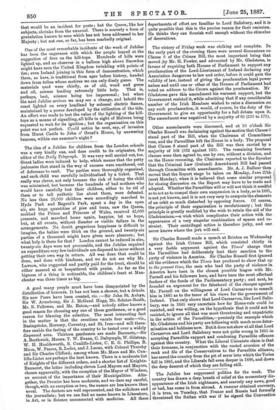A good many people must have been disappointed by the
distribution of honours. It has not been a shower, but a drizzle. Six new Peers have been created, viz. :—Sir John St. Aubyn, Sir W. Armstrong, Sir J. McGarel Hogg, Mr. Sclater.Booth, Mr. E. Fellowes, and Mr. Eaton,—and nobody either knows a good reason for choosing any one of those gentlemen, or a good reason for blaming the selection. The most interesting fact in the matter is that the creations vacate four seats—viz., Basingstoke, Hornsey, Coventry, and St. Ives—and will there. fore enable the feeling of the country to be tested over a widely dispersed area. Thirteen gentlemen are made Baronets,—Sir A. Borthwick, Messrs. T. W. Evans, C. Dalrymple, W. Gihtrap, W. H. Houldeworth, S. Cunliffe•Lister, C. E. G. Phillips, R. Moon, W. Pearce, B. Loder, and P. Lucas, with Colonel Thursby and Sir Charles Clifford; among whom Mr. Moon and Mr. Can- liffe-Lister are perhaps the best known. There is a moderate list of Knights of the different orders, and a shorter list of Knights. Banneret, the latter including eleven Lord Mayors and Mayors, chosen apparently, with the exception of the Mayor of Windsor, on account of the importance of their Municipalities. Alto- gether, the Premier has been moderate, and we dare say careful, though, with an exception or two, the names are less known than usual. The doctors are well represented, and the solicitors and the journalists; but we can find no name known in Literature, in Art, or in Science unconnected with medicine. All these departments of effort are familiar to Lord Salisbury, and it is quite possible that this is the precise reason for their omission. He thinks they can flourish well enough without the stimulus of decorations.


































 Previous page
Previous page